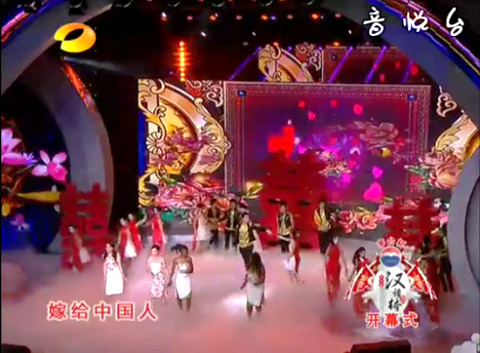“I Want to Marry a Chinese Man”
The battle diary of a foreigner on Chinese TV – by Sasha Draggeim
“More emotion! Make it natural! Relax!!” the director shouted into his microphone as I awkwardly pranced around the stage, background dancers scurrying to and fro. The advice wasn’t helping: the more I tried to act natural, the more nervous I was at the prospect of appearing on television in China to millions of viewers in a tiny strapless dress, singing “I Want to Marry a Chinese Man” in Mandarin.
I was rehearsing a song for the opening ceremony of a Chinese competition, to be broadcast on Hunan TV, China’s largest entertainment station and the equivalent of MTV. The station is based in Changsha, the capital of Hunan province in south-central China, known for its spicy Hunanese cuisine. A graduate student at the Ohio State University, I was flown into Changsha to sing a song with three other foreign girls.
Several weeks earlier, I had received a somewhat mysterious e-mail from a Hunan TV employee, with a demo version of the song that I was to prepare as well as the lyrics:
I am an American girl, but my heart has been longing for the mysterious Orient. Carrying a traveling bag, I came here to look for my dream – the dragon’s hometown!
Then, of course, there was the chorus:
Marrying a Chinese man! Make me your bride! This heart, this love, you should cherish it! Marrying a Chinese man! I’ll be your happy bride – this life, this world, let me share all of my happiness with you!
Upon arrival I was taken straight to the recording studio. I would never have found it on my own, tucked away on the top floor of an apartment building. But inside there is an entire little universe complete with balcony, ping pong table and a collection of tropical plants. The other girls had already recorded their parts, so it was just me and the producer, who could hear my every breath from the other side of the glass.
At the rehearsal the next day, I felt like a small foreign figure lit up by searing stage lights. I had never done anything like this before and felt very out of place. But over the course of the day, as my co-singers arrived, things began to fall into place.
At the beginning of the song, three huge-scale characters representing “double happiness” (囍), or marriage, were set up on the stage. The four of us huddled behind them, with another girl and I sharing a character. When the music started the characters rolled apart, splitting in two to reveal us standing behind wedding gowns in the middle.

One by one, we danced out to the front of the stage – clad in minimalistic dresses – to sing and dance to the chorus. The middle of the song was punctuated by a little rap:
Go onto the flower bridge, sing Peking opera, look at the foreigner wearing wedding clothes! She looks shy, but she is really a sweetheart!
The show was luan (乱) – messy – but in a peculiar, functional way. Two minutes before going on, we weren’t sure from which side we were to exit the stage, and we choreographed our dance for the chorus only twenty minutes before in the dressing room. But viewers saw a clean, polished performance – such is the magic of Chinese TV!
One impression I took away is that my co-performers and I were pressured to play the role of foreigners as imagined by the residents of Hunan province. I could hardly feel otherwise as the French boys walked around in berets with a baguette tucked in their bags, while the Russian girls put on braid wigs and golden head ornaments. Even the makeup was designed to make us look as foreign as possible. Why were they smearing white cream on my nose, I asked? “To make it look higher.”
A few days later, leaving this world of wigs and higher noses, I returned to my daily routine of class and thesis research in Guizhou. Would I really like to marry a Chinese man? I am often asked when I tell this story. I usually respond: I don’t know. Chinese or Western, I would like to marry a good man.
•
Sasha Draggeim is an exchange student in Guizhou Normal University, Southern China. Here is a video of Sasha's fifteen minutes of fame

















